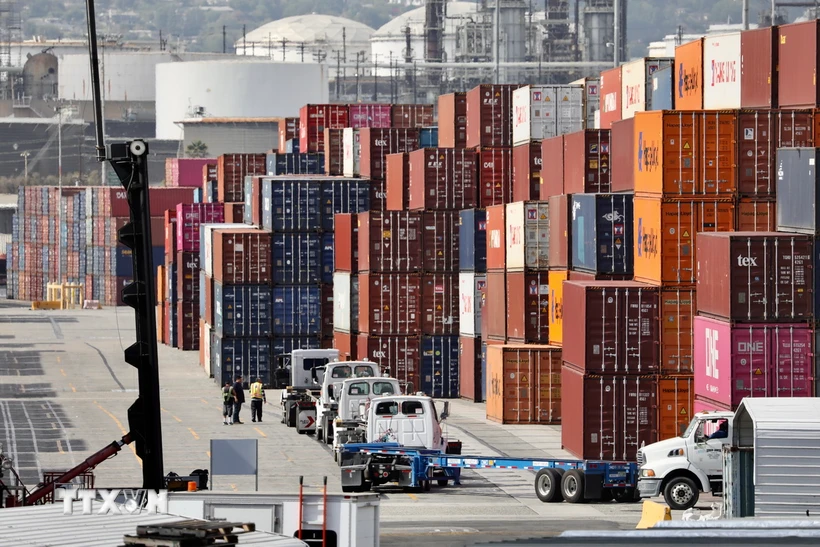 |
| Illustrative photo. Source: AFP/VNA |
Developing countries now face a series of intertwined risks: imported inflation (in the context of rising tariffs) could push the global economy into recession, thereby reducing export prices, increasing uncertainty in the business environment, and sharply reducing foreign direct investment.
.
The new US tariff policy poses many challenges for developing countries. To survive and develop, this group of countries must overcome instability while still meeting the needs of jobs and development opportunities for their rapidly growing young population.
This goal requires a balance between maintaining open markets and protecting economic sovereignty . However, this is not easy to achieve.
Most developing countries in Africa, Latin America, and parts of South and Central Asia depend on extractive industries and agricultural exports – sectors often dominated by (mainly Western) multinational corporations.
These corporations are often accused of merely extracting resources without bringing much benefit to the local economy. However, the situation is changing as more governments assert their economic sovereignty and demand a fairer share of the value created by foreign investment.
To rebalance this relationship, developing countries need to negotiate more transparent contracts and build strong institutional capacity to secure more favorable terms, increase tax revenues, and invest in infrastructure and social programs.
For capital-intensive extractive industries, well-designed localization policies can create positive spillover effects and boost job creation. Some governments require multinational corporations to process raw materials in the domestic market.
For example, Botswana uses its 15% stake in De Beers – the world's largest diamond company – to increase the proportion of rough diamonds cut domestically.
There is also a view that developing economies should abandon open markets to avoid domination by multinational corporations.
However, Mr. Rabah Arezki noted that cutting ties with multinational corporations would force countries to develop autarky, hindering technological advancement and reducing access to international markets and finance. Even China - with its size and strong economic growth - has never done so.
Still, adjustments are needed. Experts agree that small and medium-sized enterprises (SMEs) play a vital role in job creation in developing countries, but the reality is more complicated.
In many places, the labor market is divided: on one side are state-owned enterprises and private companies (including multinational corporations), on the other are small and medium-sized enterprises (SMEs) that operate informally, are low in productivity and struggle to pay their workers a living wage. Only a few SMEs are able to scale, attract talent, pool finance and access international markets.
However, prioritizing support for SMEs simply because of their size is a misguided approach, as subsidies to SMEs rarely lead to sustainable growth. For example, when the SME support program in India was abolished in the late 1990s, the impact on employment was negligible.
A more effective solution is a “hybrid” industrial policy – combining temporary subsidies for SMEs (with clear enforcement provisions) with competitive pressures – to promote efficiency and avoid waste. More importantly, governments need to welcome multinational corporations, but strongly encourage technology sharing and localisation of production to create high-quality jobs.
China is an example. After joining the World Trade Organization (WTO) in 2001, China promoted technology transfer by requiring foreign corporations to form joint ventures with Chinese companies.
China's strategy is possible thanks to the appeal of cheap labor and a large domestic market.
Meanwhile, other Asian countries, despite their efforts to attract foreign corporations, have had difficulty localizing production and developing expertise.
Mr. Rabah Arezki emphasized that in the context of a fragmented world economy, the driving force for economic sovereignty is increasingly strong, multinational corporations must pay attention to the needs of developing economies - that is, the desire to share more fairly the benefits of global economic growth, as well as the benefits of open markets.
Source: https://baophuyen.vn/kinh-te/202505/kinh-te-toan-cau-phan-manh-thach-thuc-doi-voi-cac-nuoc-dang-phat-trien-5500f37/





























![[Photo] National Assembly Chairman Tran Thanh Man visits Vietnamese Heroic Mother Ta Thi Tran](https://vphoto.vietnam.vn/thumb/1200x675/vietnam/resource/IMAGE/2025/7/20/765c0bd057dd44ad83ab89fe0255b783)




































































Comment (0)